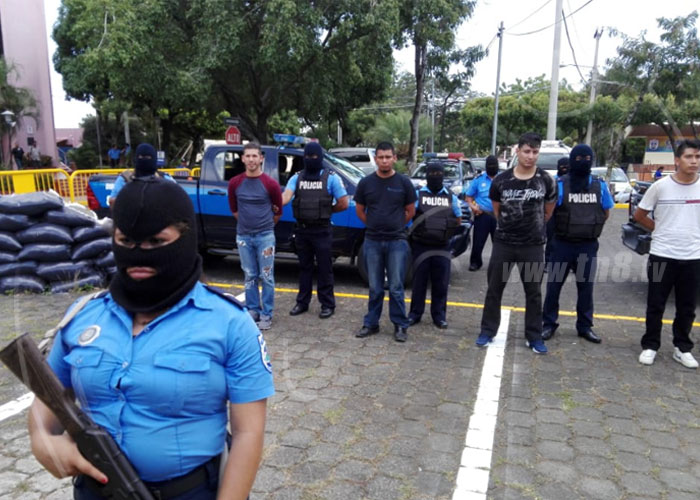13 de mayo 2019

IDL Reporteros: The Newsroom That Dares to Challenge Peru’s Political Elite

PUBLICIDAD 1M
PUBLICIDAD 4D
PUBLICIDAD 5D
The jailers and torturers in Nicaragua are also imprisoned by fear and enslaved by their insignificant quotas of power.

Edwin Carcache (l) a leader of the April 19th Student Movement is accused by the Police of heading up a terrorist group. Photo: TN8 / Confidencial
In her book “The Origins of Totalitarianism,” Hannah Arendt literally states: “What makes men obey or tolerate real power and, on the other hand, hate people who have wealth without power (or who do not have it, in my opinion), is the rational instinct that power has a certain function and is of some general use.”
I agree completely with this quote, with the exception of what I put in parentheses. And I also believe that when power originates from a tyrannical regime in crisis, it is particularly cruel in all of its machinery, from the top down and as Arendt says, it is more of a power/hate directed against the most vulnerable (the young, women and small farmers), as well as against dissidents.
The only way I can explain the violently passionate conduct of the subordinates of the centralized [Ortega] power structure [in Nicaragua] against the “blue and white” opposition -I’m talking about those who have their own “little power” to use against the people-, is to rely on what this philosopher explained in her famous book “Eichmann in Jerusalem: A Report on the Banality of Evil,” (which was controversial at that time for its analysis of man, evil and the system). Or to put it plainly, those who use repression directly as a “punishment” when confronted with social resistance towards the government, and how those who enact vengeance through terrible cruelty end up becoming an essential part of the system in crisis.
All of those working in this system (to sustain the government), I must repeat, also exercise small or minuscule quotas of power. The uniform, the official rank, the rifle at the shoulder or the billy club in the hand, are all ways to exercise power towards and against their fellow man or woman, and they know this, either consciously or instinctively—it does not matter—and know they can exercise this power however they please.
However, I also think that like everyone else, they must have some scrap of human conscience (or humanist). Here I refer to the movie “The Piano” by Roman Polanski, in which the main actor, Adrien Brody, plays the part of Jewish pianist Szpilman, whom a Nazi captain discovered in hiding when Berlin was falling and this Nazi let him live. This movie is based on fact.
I am explaining all this as a framework for the cruel conditions in which political prisoners are being held, and as a way to try to understand the reason for so much hate and oppression. Every single damn day for a year now, we have been hearing their mothers, fathers, sisters and brothers or their lawyers denouncing on the news, distressed and in desperation, the brutal conditions in which these prisoners live.
Each family member goes on and on without tiring, describing what the prisoners live through every day and what we already know, yet we keep listening, filled with rage and impotence. The burning heat in the tiny cubicle, the darkness and absolute lack of sunlight that is making them depressed, the thick, heavy air they breathe through a tiny crevice, that the majority are sick, that they are allowed little water to drink and that water is contaminated, that they can’t sleep at night and they can’t move around during the day, and that they are getting sicker and sicker.
That there are all kinds of spiders and bugs eating their skin, that there is no medical attention, that the food is rotten and stinky, that they are not allowed to take their own medicines that they have been brought, or eat and drink the food that family members bring to them, and that some of them are not even allowed to see their visitors as another form of punishment.
Let’s not even talk about the killings or the abuse that they also denounce, as well as the illegal nature of these lockups, nor of the torment to which they were subjected during the first weeks of their kidnappings (according to international human rights networks). I am totally convinced that these prison conditions are not aceptable for even the worst criminals or for animals of any species.
I’m not saying that the jailers have to act like Saint Francis of Assisi or Our Lady of Fátima, but they should at least show some empathy towards their fellow man or woman. This lack of feeling, this total lack of compassion, this indifference towards the pain of others or in the worst of cases, to feel pleasure in causing that pain, is an expression not only of mental illness coming from the vengeful power that they are exercising, but also of a lack of respect for themselves because they are renouncing the human dignity that differentiates us from tail-dragging reptiles.
I use the term “tail-dragging” as a synonym for vile and miserable because there are animals, including reptiles, that are more noble. And I extend this sentiment to the police in general where there must be some really bad apples who have committed crimes, and that will be for the courts to decide. But I also believe that there are officials and police in the rank-and-file who act aggressively and in a senseless manner because they are being forced to and because they are afraid, not only of losing their own power but also afraid of the power that is clamping down on them.
It is human for the subordinate to be afraid to rebel against this authority, against the orders of the power/hate, and this fear—we have to recognize—is also part of the human element, just like the fear that farm animals feel towards their owners, or that thousands of Nicaraguans have felt since the uprising in April.
I cannot forget that one of the former female political prisoners, when she was released said that among other things there was a female police officer (a jailer), who in the middle of it all was “a good person.” Apart from all the cynics and fanatics, those who feel alienated and poisoned by the hate that those in power have inoculated them with and who also exercise that power over them, I want to think that there are many who have not become totally dehumanized and that they just are afraid.
To believe that all of them have completely lost the most basic of human sensitivity and feeling is to lose faith in their “human” part, in their positive, ethical side, that part that must be hidden, curled up in a fetal position in fear. This is why I refuse to abandon the hope that at some moment they will leap out of the abyss of their fear towards their own human freedom, because they are also imprisoned by fear and enslaved by their insignificant quotas of power.
Thank you for reading our English section, brought to you in collaboration with Havana Times. If you wish to subscribe to our English Weekly Newsletter, you can do it here. Please spread the word and share this link with your friends, family or contacts.
Regards,
Archivado como:
PUBLICIDAD 3M
PUBLICIDAD 3D